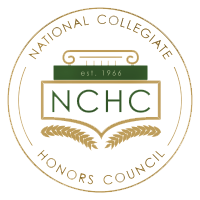"Honors education is characterized by in-class and extracurricular activities that are measurably broader, deeper, or more complex than comparable learning experiences typically found at institutions of higher education. Honors experiences include a distinctive learner-directed environment and philosophy, provide opportunities that are appropriately tailored to fit the institution's culture and mission, and frequently occur within a close community of students and faculty." - National Collegiate Honors Council (NCHC)
Why Participate in Honors?
Honors Academy focuses on personal, professional, and intellectual development through layering high-impact experiences - the transformative education that is outlined in the university's Quality Enhancement Plan (QEP), Aggies Commit to Learning for a Lifetime.Benefits to an Honors Education
- Innovative curriculum and expanded course options
- Increased prestige
- Engaged community
- Priority registration
- Specialized advising
- Interdisciplinary interaction
- Support for participation in campus conferences
- Special access to enriching experiences
The central goal of an Honors education at Texas A&M is to provide students who thrive on challenge and enrichment the opportunity to realize their full potential of personal, professional, and intellectual growth. We believe that promising students benefit from:
Honors Academy at Texas A&M University is an ideal opportunity for motivated, curious students who are filled with big ideas, who long for outlets for creative expression, and who seek out intellectual challenges. Our goal is to make available the resources of a major research institution whose track record of academic success demonstrates a readiness to take greater personal responsibility for their own education.
The defining characteristic of Honors study at Texas A&M University is engagement. While each academic discipline across the campus has its own pedagogical style, students in Honors classrooms are encouraged to speak, inquire, write, challenge, and do. In many cases, Honors students are introduced to research resources or interactive learning that are more typical of graduate than of undergraduate education.
- Close contact with accomplished faculty
- Collaborative learning with other motivated students
- Small, discussion-based seminars and/or one-on-one instruction
- Knowledge production through individual research experiences
- Engagement with internships, foreign study, and campus or community service
Honors Academy at Texas A&M University is an ideal opportunity for motivated, curious students who are filled with big ideas, who long for outlets for creative expression, and who seek out intellectual challenges. Our goal is to make available the resources of a major research institution whose track record of academic success demonstrates a readiness to take greater personal responsibility for their own education.
The defining characteristic of Honors study at Texas A&M University is engagement. While each academic discipline across the campus has its own pedagogical style, students in Honors classrooms are encouraged to speak, inquire, write, challenge, and do. In many cases, Honors students are introduced to research resources or interactive learning that are more typical of graduate than of undergraduate education.
What is an Honors Education?
Honors is a distinct approach to undergraduate education that:- Incubates new curriculum and pedagogy through layering high-impact educational experience
- Provides an opportunity for close contact between faculty and students, and
- Offers curricular challenges that would not otherwise exist.
Honors Options
Students are considered "Honors Students" if they have been accepted to an Honors program (see link for application information). Incoming freshmen Honors Students, regardless of class rank or test score, are eligible to register for Honors sections at their New Student Conferences.Students are Honors-Eligible as entering freshmen if they are accepted to the University Honors Program or one of the college or departmental Honors programs (see Student Rule 16).
Freshman Honors-Eligible students may register for available seats in Honors sections after the last New Student Conference (the week before freshman classes begin).
Continuing students are Honors-eligible if they earn a cumulative GPR of 3.5 or better. Continuing Honors-Eligible students may register for Honors courses during their regularly scheduled registration time.
Contact us if you receive an Honors attribute restriction when trying to register at the appropriate time, or if you have any questions.
History of Honors at Texas A&M
Opportunities for Honors study at Texas A&M University were initiated in the mid-1960s in what was then the College of Arts and Sciences. Subsequently, the Colleges of Liberal Arts, Science, and Geosciences co-sponsored an Honors Program, and by 1968 all of the academic colleges had joined in the endeavor.In 1978, the University Honors Program offered a modest thirty honors sections of twenty different courses, with only three upper-division (300-400) courses available. Ten years later, the number of honors sections jumped to 148 in 117 different courses, but the number of upper-division sections available was still relatively small at thirty eight. Annual enrollments had climbed from 650 to over 2,000. On average, we now see over 800 sections of Honors courses are offered each academic year. Student enrollment in these courses now tops 4,000 each semester.
In Fall 2012, the University Honors Program shifted to application-based entry and began requiring freshman admitted to the program to live in the Honors Housing Community and participate in a freshman learning community seminar. Upperclassmen in the program are now required to maintain a learning portfolio and participate in Honors Student Council events each semester. The revised program also features a new graduation distinction, Honors Fellows, that requires all students to complete a capstone experience. Students participating in the University Honors Program may also take advantage of optional structured honors courses and study sequences offered in several academic colleges and a growing number of departments. in 2018, we celebrated 50 years of university-wide Honors opportunities at Texas A&M.
Honors options for students not interested, or not accepted to the University Honors Program include participating in Honors courses without being part of University Honors or a College or Departmental Honors Program.
